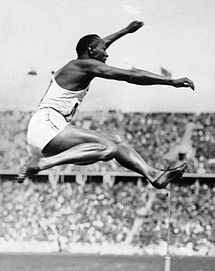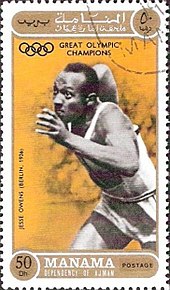Jesse Owens
James Cleveland "Jesse" Owens (September 12, 1913 – March 31, 1980) was an American track and field athlete who won four gold medals at the 1936 Olympic Games.
[3] Owens specialized in the sprints and the long jump and was recognized in his lifetime as "perhaps the greatest and most famous athlete in track and field history".
[4] He set three world records and tied another, all in less than an hour, at the 1935 Big Ten track meet in Ann Arbor, Michigan, a feat that has never been equaled and has been called "the greatest 45 minutes ever in sport".
He was the most successful athlete at the Games and, as a black American man, was credited by ESPN with "single-handedly crushing Hitler's myth of Aryan supremacy".
[3] At the age of nine, he and his family moved to Cleveland, Ohio for better opportunities as part of the Great Migration (1910–40) when 1.6 million African Americans left the segregated and rural South for the urban and industrial North.
[15] On that day, Owens set three world records and tied a fourth in a span of 45 minutes during the Big Ten meet at Ferry Field in Ann Arbor, Michigan.
[6] In 2005, University of Central Florida professor of sports history Richard C. Crepeau chose these wins on one day as the most impressive athletic achievement since 1850.
[18] In 1936, Owens and his United States teammates sailed on the SS Manhattan and arrived in Germany to compete at the Summer Olympics in Berlin.
On August 9, Owens won his fourth gold medal in the 4 × 100 m sprint relay when head coach Lawson Robertson replaced Jewish-American sprinters Marty Glickman and Sam Stoller with Owens and Ralph Metcalfe,[22] who teamed with Frank Wykoff and Foy Draper to set a world record of 39.8 seconds in the event.
[26] Later the same day, Owens's African-American team-mate Cornelius Johnson won gold in the high jump final (which began at 5:00 p.m.) with a new Olympic record of 2.03 meters.
[28] Hitler was subsequently accused of failing to acknowledge Owens (who won gold medals on August 3, 4 (two), and 9) or shake his hand.
[34] Additionally, an article in The Baltimore Sun in August 1936 reported that Hitler sent Owens a commemorative inscribed cabinet photograph of himself.
[39][40] Nazi minister Albert Speer wrote that Hitler "was highly annoyed by the series of triumphs by the marvelous colored American runner, Jesse Owens.
People whose antecedents came from the jungle were primitive, Hitler said with a shrug; their physiques were stronger than those of civilized whites and hence should be excluded from future games.
[45] After the parade, Owens was not permitted to enter through the main doors of the Waldorf Astoria New York and instead forced to travel up to the reception honoring him in a freight elevator.
Following the 1936 Olympics where Owens won four gold medals, racism back home led to difficulty earning a living despite his international acclaim.
Owens struggled to find work and took on menial jobs as a gas station attendant, playground janitor,[56] and manager of a dry cleaning firm and at times resorted to racing against motorbikes, cars, trucks and horses for a cash prize.
[57] Owens was prohibited from making appearances at amateur sporting events to bolster his profile, and he found out that the commercial offers had all but disappeared.
[59] Owens was involved politically and lent his support to the Republican Party and Alf Landon in the 1936 United States Presidential Election, saying that Adolf Hitler congratulated him but that he was snubbed by President Franklin Roosevelt after winning a gold medal.
[60][61] In 1942, Willis Ward—a friend and former competitor from the University of Michigan[62]—who was then working at Ford Motor Company as Assistant Personnel Director, invited Owens to Detroit.
Ward worked for the Ford Motor Company's "ad hoc civil rights division, serving as the liaison between black and white workers"[63][64] and was an advocate for African American employees in the personnel department.
He also challenged and defeated racehorses; as he revealed later, the trick was to race a high-strung Thoroughbred that would be frightened by the starter's shotgun and give him a bad jump.
"[55] He traveled to Rome for the 1960 Summer Olympics, where he met the 1960 100 meters champion Armin Hary of Germany, who had defeated American Dave Sime in a photo finish.
[70] Owens ran a dry cleaning business and worked as a gas station attendant to earn a living, but he eventually filed for bankruptcy.
Republican President Dwight D. Eisenhower enlisted Owens as a goodwill ambassador in 1955 and sent the world-renowned track star to India, the Philippines, and Malaya to promote physical exercise as well as tout the cause of American freedom and economic opportunity in the developing world.
[73] Owens initially refused to support the black power salute by African-American sprinters Tommie Smith and John Carlos at the 1968 Summer Olympics.
There's where the power lies.Four years later in his 1972 book I Have Changed, he revised his opinion: I realized now that militancy in the best sense of the word was the only answer where the black man was concerned, that any black man who wasn't a militant in 1970 was either blind or a coward.Owens traveled to Munich for the 1972 Summer Olympics as a special guest of the West German government,[75] meeting West German Chancellor Willy Brandt and former boxer Max Schmeling.
[76] A few months before his death, Owens had unsuccessfully tried to convince President Jimmy Carter to withdraw his demand that the United States boycott the 1980 Moscow Olympics in protest of the Soviet invasion of Afghanistan.
September 12, 1913 – March 31, 1980.Jimmy Carter issued a tribute to Owens: "Perhaps no athlete better symbolized the human struggle against tyranny, poverty and racial bigotry.
"[80] The dormitory that Owens occupied during the Berlin Olympics has been fully restored into a living museum, with pictures of his accomplishments at the games, and a letter (intercepted by the Gestapo) from a fan urging him not to shake hands with Hitler.








